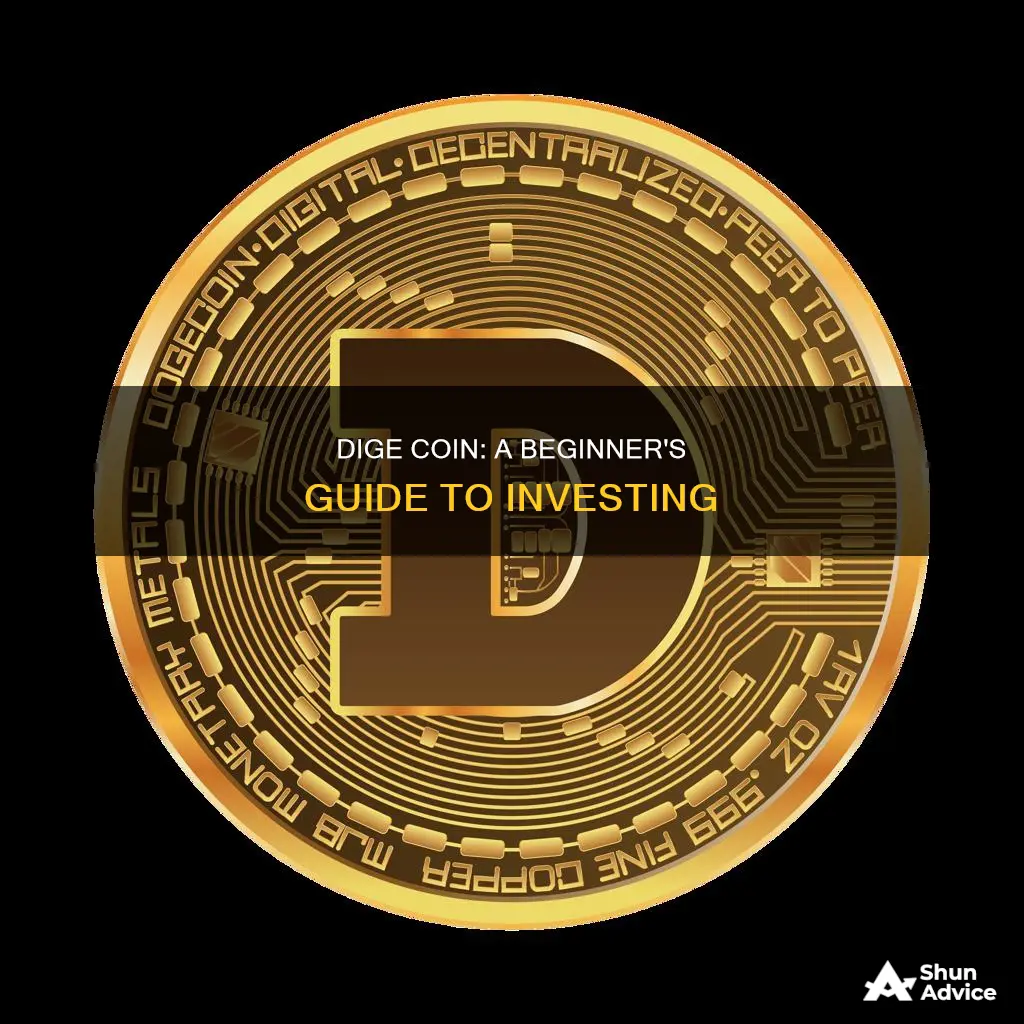
Dogecoin is a cryptocurrency created as a joke based on the popular meme of a Shiba Inu dog. Despite its playful origins, Dogecoin has gained a cult status among investors, with some early investors seeing a 7,000% return on their investment.
In this guide, we will walk you through the process of investing in Dogecoin, including choosing a wallet and an exchange, and making your first purchase.
What You'll Learn

Choosing a Dogecoin wallet
When choosing a Dogecoin wallet, it's important to consider your needs and preferences. There are several types of Dogecoin wallets available, each with its own advantages and disadvantages. Here are some factors to consider when selecting a Dogecoin wallet:
- Security: Look for wallets that offer robust security features such as two-factor authentication, multi-signature functionality, or cold storage options. Ensure that the wallet has a good track record and no reported security breaches.
- Ease of use: If you're new to cryptocurrency, opt for a wallet with a simple and intuitive user interface. This will make managing your coins less stressful.
- Backup and restore options: Choose a wallet that allows you to easily back up your data and restore it if needed. This ensures that you don't lose access to your coins in case of any issues.
- Ongoing development: Select a wallet that is regularly updated and improved by its development team. This indicates that the wallet will continue to evolve and incorporate new features.
- Customer support: Consider the wallet's customer support options. In case of any issues or queries, you'll want to be able to reach out to a responsive and helpful support team.
- Positive reviews: Don't rely solely on the wallet provider's marketing. Check independent online reviews to get a balanced view of the wallet's pros and cons, and whether it is recommended by other users.
There are several types of Dogecoin wallets available, including:
- Hot wallets: These are online or software wallets that maintain a constant connection to the internet. They are typically more convenient and accessible but may offer lower security compared to cold wallets. Examples include mobile apps, browser extensions, and downloadable software.
- Cold wallets: Cold wallets are hardware devices that store your cryptocurrencies offline. They are considered more secure since they are not connected to the internet. Examples include hardware wallets like Ledger Nano X, Trezor Model T, and KeepKey.
- Software wallets: These wallets are usually downloaded and installed on your computer or mobile device. They can be convenient and offer more control over your private keys. Examples include Atomic, Guarda, and Coinomi.
- Hardware wallets: As mentioned earlier, hardware wallets store your cryptocurrencies offline and are considered highly secure. They are typically in the form of physical devices like USB sticks or hard drives. Examples include Ledger, Trezor, and KeepKey.
- Paper wallets: Paper wallets are physical documents that contain your public and private keys. They are considered very secure since they are not connected to any digital systems. However, they may be more cumbersome to use and are more susceptible to physical damage or loss.
When choosing a Dogecoin wallet, it's essential to prioritize security and ease of use. Consider your needs and preferences, and don't hesitate to research and compare multiple options before making a decision. Remember that the safety of your funds is paramount, so always opt for reputable and well-reviewed wallets.
Bitcoin: Best Investment or Risky Gamble?
You may want to see also

Selecting an exchange
DigiByte can be bought and sold at a total of 94 markets across 70+ different crypto exchanges. When selecting an exchange, it is important to consider factors such as the deposit methods supported, the trading pairs available, and the fees charged.
Top Exchanges
Some of the top exchanges for buying DigiByte include:
- Binance: The world's most popular platform, Binance offers a wide range of features, including futures, mining, savings, and staking. It also offers a P2P exchange and requires KYC verification. Binance is restricted in the US.
- CoinEx: Known for its low fees and extensive selection of over 500 cryptocurrencies. CoinEx offers advanced features like margin and futures trading. It charges a trading fee of 0.2%.
- LATOKEN: Restricted in the USA, Afghanistan, Bosnia, Herzegovina, and the DPRK. LATOKEN offers futures and direct deposit of fiat currencies. KYC verification is required for withdrawals over $10,000.
- KuCoin: One of the most advanced cryptocurrency exchanges, KuCoin offers low fees and a wide range of cryptocurrencies. It also supports direct purchases with fiat currencies like USD using credit cards, debit cards, and bank accounts.
- Crypto.com: With over 250 cryptocurrencies available, Crypto.com also offers a DeFi non-custodial wallet and a blockchain for developers and companies to build custom tokens, dApps, and smart contracts.
- Huobi: A well-established exchange that started in 2013, Huobi allows users to buy crypto with USD and other fiat currencies. It offers derivatives or futures trading by margins and a peer-to-peer platform for buying and selling crypto with fiat using local methods.
Reddcoin vs Peercoin: Which is the Better Investment Option?
You may want to see also

Payment methods
DigiByte (DGB) is a highly scalable peer-to-peer digital currency that enables industry-leading transaction speeds with negligible fees. DigiByte is considered one of the best means of making digital payments.
To start using DigiByte, you need to install a DigiByte-supported wallet, then scan the QR code and send DigiByte. You can send and receive DigiBytes using devices you already own, such as your mobile phone or computer.
DigiByte Core is a DigiByte-supported wallet that also doubles as a software wallet. It contains a full copy of the blockchain and acts as the backbone of the network. It is commonly used by developers, exchanges, and businesses. However, it is recommended that advanced users only use DigiByte Core as a wallet. For beginners, it is suggested to use a simplified software wallet.
Other recommended crypto exchanges that support DigiByte trading are Coinbase and Binance. These platforms are secure, reliable, offer very low fees, and hundreds of different cryptocurrencies to choose from.
It is recommended to use hardware wallets such as Ledger Nano X and Trezor Model T instead of online wallets to keep your currencies secure.
Bitcoin Investment: Get Rich Quick or Slow Burn?
You may want to see also

Storage options
After purchasing DigiByte, it can be stored on the exchange itself, but for larger purchases, it is recommended to store the coins on your own personal offline wallet.
- Ledger Wallet (Hardware Wallet): The Ledger Nano S supports more than 700 different cryptocurrencies and is among the most secure methods for storing them safely from bad actors. Hardware wallets keep all private key information on the device in an offline environment. The Ledger Nano S is highly secure and affordable, priced at $59.
- DigiByte Core (Desktop Wallet): The DigiByte Core wallet was created by the DigiByte team specifically for storing DGB. In addition, the Core wallet functions as a blockchain node, helping to secure the entire DigiByte blockchain. The Core wallet gives you basic controls to send and receive your DGB, and it has already been installed by more than 100,000 users.
- Guarda (Desktop/Web/Mobile Wallet): Guarda is a multi-currency and multi-platform wallet. The installations sync up, allowing you to always have access to your funds and transaction history. The Guarda wallet also has an exchange built-in to convert your DGB to other coins.
- Jaxx Liberty (Desktop/Mobile/Chrome): The Jaxx Liberty wallet is a rebrand of the original Jaxx wallet with increased security features. It can store 85 different cryptocurrencies, including DGB. It syncs across mobile, web, and desktop versions, and users appreciate the ability to check their balance and transaction history in real-time across multiple platforms.
- DigiByte Go Wallet (Online Wallet/Chrome Extension): The DigiByte Go wallet is an official release from the DigiByte team. It is considered quite secure as an online wallet, and it can be created and ready to use in minutes.
- Exodus Wallet (Desktop Wallet): The Exodus wallet is a multi-currency desktop wallet known for its beautiful user interface. It is available for Android, iOS, Windows, OSX, and Linux and offers 24/7 support.
- Trust Wallet (Universal Mobile Wallet): Trust Wallet is the official Binance wallet, giving it a vote of confidence from one of the leading crypto companies. It supports over 1 million assets and covers 53 different blockchains, including DGB. It offers excellent security, ensuring that private keys are locally stored and encrypted on the device.
If you prefer maximum security, a hardware wallet like the Ledger Nano S is recommended. If you're looking for a wallet with more functionality and community support, the DigiByte Core wallet is a good choice. For those who want to store a variety of coins, one of the third-party wallets like Guarda or Trust Wallet could be considered.
It's worth noting that you can have multiple storage options for different purposes. For example, you could store the bulk of your DGB savings on a hardware wallet and keep a smaller amount in a mobile or desktop wallet for more regular transactions.
The Ultimate Guide to Investing in Ethereum and Bitcoin
You may want to see also

Risks and benefits
DigiByte (DGB) is an open-source blockchain and cryptocurrency that was developed in 2013 and launched in January 2014 by Jared Tate. It is one of the more established cryptocurrencies and has been described as a "technological masterpiece". It is a highly scalable peer-to-peer digital currency that enables industry-leading transaction speeds with negligible fees.
DigiByte has a lot going for it. It is faster, more secure, and more decentralised than many other cryptocurrencies. It is also truly decentralised, with no CEO or company controlling the blockchain. It is a volunteer-based and community-driven project. This means that there is no risk of bankruptcy.
The DigiByte blockchain has three layers: Applications/DigiAssets, Digital Asset/Public Ledger, and Core Protocol/Global Network. The top layer, Applications/DigiAssets, is like an app store where all types of digital assets can be created, including decentralised applications and smart contracts. The middle layer, Digital Asset/Public Ledger, provides security and administration and is where all DigiByte transactions are recorded. The bottom layer, Core Protocol/Global Network, facilitates communication across the DigiByte global network.
DigiByte also has a strong and passionate community. The DigiByte Awareness Team (DGBAT) is a community-driven outreach initiative that promotes the DigiByte blockchain through education, meetups, and events. The community is very active and supportive, and DigiByte has won countless exchange listings through community votes.
However, there are also some risks and drawbacks to investing in DigiByte. Firstly, it has not achieved the same level of exchange ubiquity as Bitcoin and other popular digital assets. While it is listed on over 50 exchanges, most of these do not generate much volume. This lack of support from major exchanges makes it harder for investors to purchase DGB.
Another concern is the level of development activity. Compared to other popular projects, DigiByte does not appear to have enough developers working on it. There does not seem to be a concerted effort to recruit more developers, which could hinder the progress and adoption of the DigiByte blockchain.
Additionally, there is a risk associated with the volatile nature of the cryptocurrency market. DigiByte has experienced significant price fluctuations in the past, and it is important to remember that the value of DGB can go down as well as up.
In conclusion, DigiByte has a lot of potential and its unique features make it a noteworthy investment. However, as with any cryptocurrency, there are risks involved and investors should always do their own research before investing.
Protecting Your Bitcoin Investment: Strategies to Mitigate Risks
You may want to see also
Frequently asked questions
You can buy Dogecoin on a cryptocurrency exchange like Coinbase, Binance, or Kraken. First, sign up for an account on the platform and verify your identity. Then, deposit funds into your account and use those funds to purchase Dogecoin.
Dogecoin is a highly volatile and unpredictable asset. Its price is largely driven by social media movements and hype, and there is no limit on how many Dogecoins can be created. As such, its price can fluctuate wildly and it is possible to lose money on your investment.
Financial planners generally recommend investing no more than 3% to 10% of your money in highly volatile assets like cryptocurrencies. Only invest an amount that you are comfortable losing.
You can store your Dogecoin in a crypto wallet, either a hot wallet or a cold wallet. A hot wallet is digital and connected to the internet, while a cold wallet is a physical hardware device that can be disconnected from the internet. Cold wallets are more secure but less convenient, as you need physical access to the device to access your coins.







